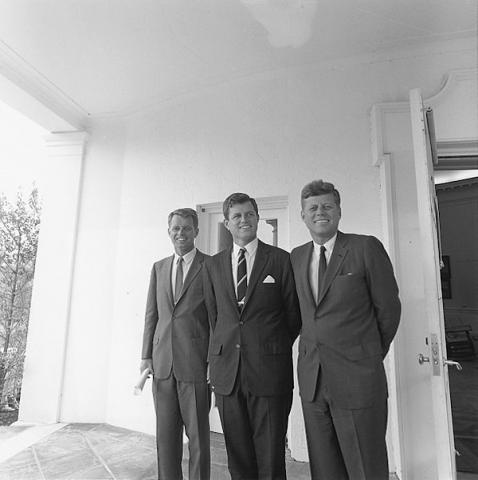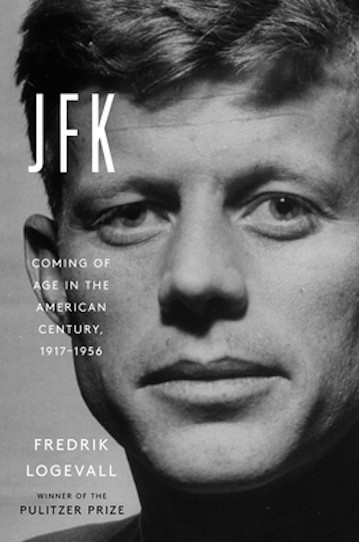A Fresh Look at Pre-Camelot Kennedy in Fredrik Logevall’s ‘JFK’

JFK: Coming of Age in the American Century 1917-1956
By Fredrik Logevall
Random House
792 pages
A public figure’s early formative years are always viewed through the lens of what that individual later becomes—opera singer, four-star general, legendary quarterback, celebrity cook, and so on. When it comes to the life story of John Fitzgerald Kennedy, the 35th president of the United States, these “early years” take on added significance in light of a century-defining act of political violence—the Kennedy assassination in Dallas on November 22, 1963.
On that day, the so-called “Camelot Presidency” came to a tragic end.
In his sweeping new biography, JFK, Pulitzer-Prizewinning historian Fredrik Logevall recounts the story of this dynasty son’s rise in the years before his 1960 presidential campaign. Logevall’s stated goal is to delve deeper into Kennedy’s origins than past biographers, but also to prove that the “more we understand Kennedy and his coming of age … the more we understand the United States in the middle of the [20th] century.”
Attempting to separate the man from the myth is, in Kennedy’s case, no easy task. Even now, decades after his assassination, the Camelot mystique still clings to his all-too-brief tenure as commander-in-chief.

For Logevall, “any serious attempt to recreate Kennedy’s world as he experienced it requires suspending as much as possible the knowledge of how it all turned out.” By doing so, history “can look the man right in the eye, not up in adulation or down in disdain.”
Born in 1917, “Jack” Kennedy grew up within the sheltered world created and perpetuated by his father, Joseph, a hugely successful banker and, eventually, the mercurial US Ambassador to the Court of St. James in London. In a family of extraordinary wealth, a Kennedy son was, from the outset, being groomed to attain the highest office in the land.
At the beginning, however, that person was supposed to be Joseph Kennedy, Jr., the patriarch’s oldest son. After his death in a B24 bomber explosion in 1944, the mantle fell to the next in line, JFK.
Much of JFK centers on the tumultuous 1930s and the worldwide conflagration following Germany’s invasion of Poland in 1939. Two years earlier, Jack and his friend Lem Billings spent several months on an undergraduate tour of Europe, including a visit to Munich and Nuremburg, where “Nazi fever” was running strong. The trip turned out to represent a pivotal point in the young Kennedy’s views on world affairs. Just as importantly, he began the journey away from his father’s isolationist approach to understanding the need to grapple with the fast-approaching global conflict.

JFK’s “determination to form independent judgments rather than simply echo his father’s assessments or give in to lazy isolationist clichés about ‘foreigners’ grew stronger,” the author writes. So did his “willingness to view world affairs in contextual, dispassionate terms—a contrast with his father, who tended always to view the outside world mostly in terms of what it meant for himself and his family.”
Another pivotal event (in a life crowded with them) occurred in the South Pacific in 1943. The patrol boat Kennedy commanded, PT 109, was attacked by a Japanese destroyer. Kennedy’s bravery in saving members of the shipwrecked crew led to decorations for heroism and, later, a bestselling book about the traumatic event. All of this helped pave the way for an eventual run for public office, first as a congressman and later as a senator from the state of Massachusetts.
The author succeeds in avoiding “looking down in disdain” at JFK, as this is by and large an admiring biography of the future president. In the interests of a comprehensive account, Logevall doesn’t shy away from cataloguing Kennedy’s philandering and, in more detail than before, his many physical ailments. The writing throughout this lengthy biography is smooth, well-reasoned, and never hyperbolic.
JFK: Coming of Age in the American Century is a solid achievement, the first volume in a projected two-volume biography covering the life of our most glamorous president.
Author Bio:
Lee Polevoi, chief book critic for Highbrow Magazine, is the author of a novel, The Moon in Deep Winter.
For Highbrow Magazine
Image Sources:
--Abbie Rowe (National Park Service, Wikimedia, Creative Commons)
--Random House
--Cecil Stoughton (White House, Wikipedia, Creative Commons)

































































































































































































































































































































